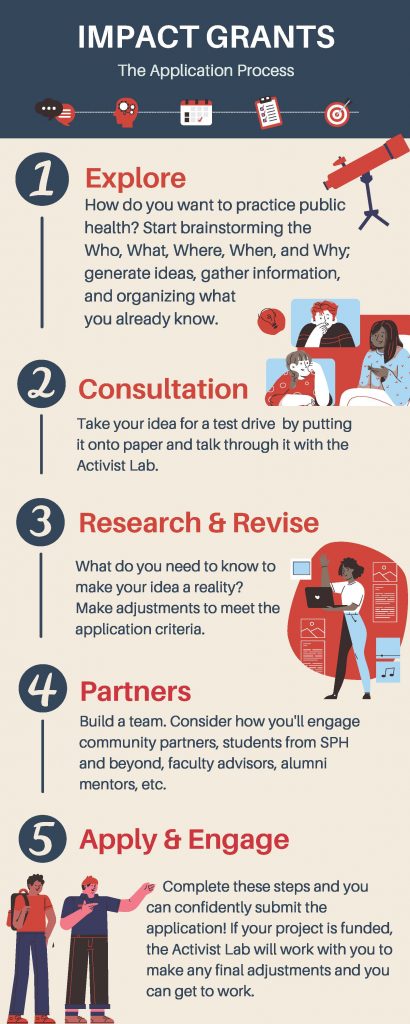Impact Grants Put the ‘Lab’ in Activist Lab.

Impact Grants Put the ‘Lab’ in Activist Lab
The micro-grant program, previously known as Activist Bucks, gives students the opportunity to experiment, take chances, and grow in their own unique public health practice.
The Activist Lab at the School of Public Health has renamed their micro-grant program, previously known as Activist Bucks, to Impact Grants.
The change comes as Craig Andrade, associate dean for practice and director of the Activist Lab, and the rest of his team are reimagining the values of the Activist Lab at SPH and their mission to help students discover what bold public health practice means to them.
“The Activist Bucks program has been a strong catalyst for how we got to this point,” says Andrade. “It allowed our students to engage in the community in ways that were truly meaningful to them. Now, we are bringing the program to the next level to provide our students with a stronger, more robust learning experience.”
At its core, the Impact Grant program provides students with the opportunity to turn their public health knowledge into real-world action. Students are awarded up to $2,000 to support their project and create meaningful change toward a public health concern of their choosing, with a maximum of five projects funded over the course of an academic year.
“This program really allows our students to dig deep and discover what inspires and drives their public health practice,” says Caroline McQuade, operations associate in the Activist Lab and first-year MPH student, who is managing the Impact Grant program. “We want these projects to be very upstream-focused so that our students can make a long-term, sustainable impact in a community that really needs it.”
The Activist Lab team recognizes that systemic change takes time, dedication, and consistency, and that the projects funded through the Impact Grant program may require more time than the duration of a student’s tenure at SPH. With this in mind, they redesigned the program to allow students to pass their projects down to future generations of SPH students to ensure that the ideas students create can evolve and live far beyond the typical two-year life cycle of an SPH student.
To ensure a more robust learning experience for students, the team has also worked to ensure that the core public health practice competencies are engrained in every aspect of the program.
“The Impact Grant program is what makes the Activist Lab a lab,” says Emily Barbo, assistant director of the Activist Lab. “It is an opportunity for students to play and test out ideas and receive feedback in real-time about who they are, how they show up in their public health practice, and where they want to go next.”
From the germination of their idea and the application process, to seeing their project through to fruition, every element of the Impact Grant program is designed to help students practice their practice. Andrade emphasizes that this does not mean that students will be perfect or “get it right” every time, but rather that students begin to feel okay with experimenting and taking chances so they can grow in their unique public health practice and continue to push public health forward.

Part of this practice comes in the form of the Impact Grant application itself, which is designed to look and have the same rigor as a grant that students may encounter in their future public health careers, consisting of an abstract, community needs assessment, program description, timeline, budget justification, and evaluation plan. The application starts with an informal idea, and students are encouraged to meet with Andrade and the rest of the Activist Lab team to flesh out their thoughts, define expectations and goals, and identify potential community partners, all before actually submitting the application.
“This is meant to be a collaborative process, especially since many of our students may not have ever seen a grant application before,” says McQuade. “We do not want them to try to fill out this application on their own. We are here to answer any questions that may come up for them and to support and encourage them throughout the entire process.”
One section of the application that McQuade says she is particularly excited about is the “Support Needed” section, which allows students the opportunity to identify how the Activist Lab can best support their project, as well as any anticipated challenges. This, McQuade says, is a time when students get to reflect on what they do and do not know, and lean on the Activist Lab’s breadth of resources to help meet their needs and enhance their experience in the program.
Students can apply for an Impact Grant on their own or as a team. Boston University students outside of SPH can apply, as well, so long as they collaborate with SPH students on their project. The Activist Lab team hopes that his opportunity for interdisciplinary projects allows for new partnerships, more diverse perspectives and experiences, and a broader definition of the term “public health practitioner.”
With every aspect of the Impact Grant program, the team hopes that students see each as a learning experience to inform their public health practice and future careers, rather than simply another box to check.
“Our students walk around with a lot of thought bubbles above their heads,” says McQuade, “so we really want to help them turn these ideas into reality and try new things, as well as get them excited about what they can do after their time at SPH. There is so much learning and growing that happens here at SPH, and even though every idea that students bring to the table may not stick, they all have the power to start some really important conversations.”
Learn more about the Impact Grant program and start your application here.